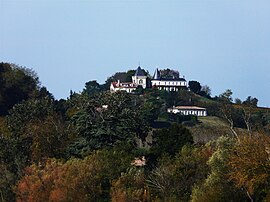Fronsac, Gironde
| Fronsac | ||
|---|---|---|
 |
||
|
||
| Coordinates: 44°55′30″N 0°16′19″W / 44.925°N 0.272°WCoordinates: 44°55′30″N 0°16′19″W / 44.925°N 0.272°W | ||
| Country | France | |
| Region | Nouvelle-Aquitaine | |
| Department | Gironde | |
| Arrondissement | Libourne | |
| Canton | Fronsac | |
| Intercommunality | Fronsac | |
| Government | ||
| • Mayor (2014–2020) | Marcel Durant | |
| Area1 | 15.29 km2 (5.90 sq mi) | |
| Population (2012)2 | 1,146 | |
| • Density | 75/km2 (190/sq mi) | |
| Time zone | CET (UTC+1) | |
| • Summer (DST) | CEST (UTC+2) | |
| INSEE/Postal code | 33174 /33126 | |
| Elevation | 1–84 m (3.3–275.6 ft) (avg. 30 m or 98 ft) |
|
|
1 French Land Register data, which excludes lakes, ponds, glaciers > 1 km² (0.386 sq mi or 247 acres) and river estuaries. 2Population without double counting: residents of multiple communes (e.g., students and military personnel) only counted once. |
||
1 French Land Register data, which excludes lakes, ponds, glaciers > 1 km² (0.386 sq mi or 247 acres) and river estuaries.
Fronsac is a French commune in the Gironde department in the Nouvelle-Aquitaine region in southwestern France. The town gave its name to the Fronsac AOC wine.
The commune is situated in the Fronsadais and is bordered on the south by the Dordogne River and on the east by the Isle River, which separates it from Libourne. Fronsac is 40 km northeast of Bordeaux and 5 km northwest of Libourne and the Saint-Émilion and Pomerol appellations.
Fronsac's mound owes its history to its privileged position. It was the site of the Gauls' market, the Romans erected an altar there, and Charlemagne built a fortified camp on the mound ("Franciacus") in 769, where the Basques led by duke Lupo came to pledge allegiance to the Frankish King after Aquitaine's submission. In 849, Fronsac was pillaged by Hasting, the chief of the Vikings. The Marechal of Richelieu had a "folly" built there, to an extravagant architectural design, where he held courtly entertainments. As word spread of these events, the renown of Fronsac's wines was carried with it to the Court of Versailles. In the 18th Century, the names of Fronsac and Canon Fronsac enjoyed a very good reputation. It was at this time that the concept of "cru" first appeared in the Libournais.
...
Wikipedia



